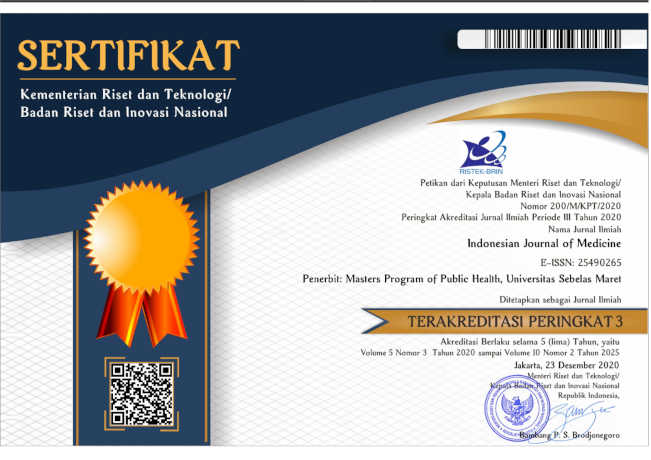Effectiveness “Kamio” on Treatment Compliance and Quality of Life Bipolar Disorder Patient in Dr. Iskak General Hospital, Tulungagung, East Java
DOI:
https://doi.org/10.26911/theijmed.2022.7.3.553Abstract
Background: Bipolar Disorder is a chronic disease with various variations in the course of the disease that are often unknown, misdiagnosed and even when diagnosed are often not adequately treated. The aim of the study was to analyze the effectiveness of KamiO on quality of life in Bipolar Disorder patients at dr. Iskak Tulungagung Hospital.
Subjects and Method: Observational study with randomized control trial was conducted at dr. Iskak General Hospital, Tulungagung, East Java, from May 25 to August 25, 2022. The study population were 160 patients with bipolar disorder. A 114 sample was selected using the simple random sampling divided into (1) 57 sample in the treatment group and (2) 57 sample in control group. In this study, the independent variable was KAMIO. The dependent variable is medication adherence and quality of life. While the measuring instrument used is a questionnaire. Data analysis using Mann Whitney test.
Results: Patients in the intervention group more adherent to visit medical treatment (Mean= 63.00) than control group (Mean= 52.00), with p= 0.039. Quality of life in bipolar disorder patients in the intervention group (Mean= 72.25) was higher than in the control group (Mean= 42.75) and it was statistically significant (p<0.001).
Conclusion: Quality of life in the intervention group (kamio cards) is higher than in the control group.
Keywords: kamio effectiveness, treatment adherence, quality of life, bipolar
Correspondence: Katmini. STRADA Indonesian Institute of Health Sciences. Jl. Manila No. 37, Kediri, East Java 64123, Indonesia. Email: katminitini@gmail.com. Mobile: 0823-3466-2921.
Indonesian Journal of Medicine (2022), 07(03): 337-343
https://doi.org/10.26911/theijmed.2022.07.03.10
References
Bipolar Indonesia, BC (2019). Mental Disability.bipolarcareindonesia.co.id.
Bipolar Indonesia, BC (2020). Maintaining Mental Health During the Corona Virus Pandemic.
Conolly KR, Thase ME (2011). A Review of EvidenceBased Guidelines: The Clinical Management of Bipolar Disorder. Prim. Care Companion CNS Disord. 13(4). Doi: 10.4088/PCC.10r01097.
Evans DL (2020). Bipolar disorder: diagnostic challenges and treatment considerations. J Clin. Psychiatry. 13: 2631. PMID: 11153808.
McGuffins P, Rijdijk F, Andrew M, Shem P, Katz R, Cardon A (2016). The heritability of bipolar affective disorder and the genetic relationship to unipolar depresion. Archives Gen Psychiatry. 60(5): 497502. Doi: 10.1001/archpsyc.60.5.497.
Miklo JD, Jonhson SL (2020). The Psychopathology and Treatments of Bipolar Disorder. Annu Rev Clin Psycol. 2: 199235. Doi: 10.1146/annurev.clinpsy.2.022305.095332.
Sadock BJ, Sadock VA (2020). Textbook of Clinical Psychiatry. Lippincott Williams and Wilkins, USA. 189216.
Spitzer fL, Endicott J, Robins E (1978). Research diagnostic criteria: rationale and reliability. arch. Gene. Psychiatry. 35(6): 77S–782. Doi: 10.1001/archpsyc.1978.01770300115013.
Stockmeir CA (2003). Involvement of serotonin in depression: evidence from postmortem and imaging studies of serotonin receptor and the serotonin transporter. J Psychiatrists Res. 37(5): 357373. Doi: 10.1016/s00223956(03)000505.
Teles F, de Azevedo VFD, de Miranda CT, de Melo Miranda MP, Elias RM (2014). Depression in hemodialysis patients: The role of dialysis shift. Clinics. 69(3): 198–202. Doi: 10.6061/clinics/2014(03)10.
Tohen M, Angst J (2002). Epidemiology of Bipolar Disorder. In MT Tsuang & Tohen M (Eds). Textbook in Psychiatric Epidemiology second edition. 427447.
Tohen M, Stoll AL, Strakowski SM, Faedda GL, Mayer PV, Goodwin DC, Kolbrener M et al. (1992). The McLean FirstEpisode Psychosis Project: sixmonth recovery and recurrence outcome. Schizophr. Bull. 18(2): 27382. Doi: 10.1093/schbul/18.2.273.
Winurini S (2020). Permasalahan Kesehatan Mental Akibat Pandemi COVID19. Info Singkat, XII. (15): 13–18.











